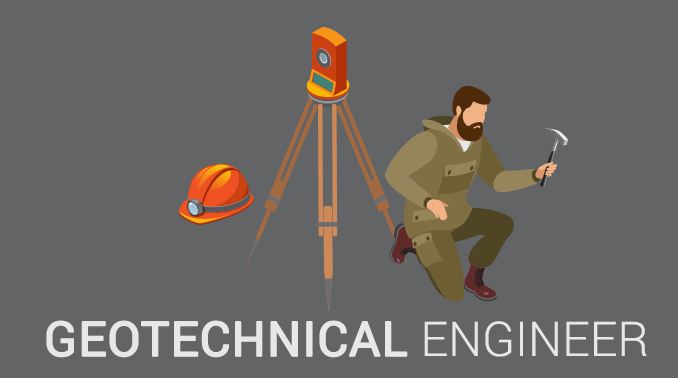Some Known Details About Geotheta

A geotechnical engineer is a specialized civil designer who concentrates on the behavior of soil, rock, and various other materials discovered underneath the Planet's surface. They use clinical principles and engineering methods to evaluate the homes and actions of these materials to support the safe and effective design, construction, and maintenance of framework projects.
They carry out website examinations, collect examples, perform lab examinations, and examine information to evaluate the viability of the ground for building and construction projects - Consulting Engineers. Based upon their searchings for, geotechnical engineers supply referrals for structure layout, slope stability, retaining structures, and mitigation of geotechnical risks. They work together with various other specialists, such as engineers, structural engineers, and building teams, to make sure that geotechnical factors to consider are incorporated right into the total task design and implementation
By assessing the behavior and residential or commercial properties of soil and rock, they can identify potential geotechnical threats such as landslides, dirt negotiation, or slope instability. Their knowledge aids avoid failures or accidents that could endanger lives and building. Here are some comprehensive tasks and obligations of a geotechnical engineer: Site Examination: Geotechnical engineers conduct site investigations to gather information on subsurface problems.
They analyze the information to comprehend the residential or commercial properties and behavior of the soil and rock, including their strength, permeability, compaction attributes, and groundwater problems. Geotechnical Analysis and Layout: Geotechnical designers examine the data collected throughout website investigations to evaluate the stability and viability of the website for construction projects. They perform geotechnical computations and modeling to examine aspects such as birthing capability, settlement, slope stability, lateral earth stress, and groundwater circulation.
Geotheta Fundamentals Explained
Structure Design: Geotechnical designers play a crucial duty in making foundations that can securely sustain the desired structure. They analyze the soil conditions and lots requirements to identify the ideal structure kind, such as shallow structures (e.g., footings), deep structures (e.g (https://geotheta.start.page)., piles), or specialized strategies like dirt improvement. They consider factors such as settlement restrictions, birthing ability, and soil-structure communication to establish optimal structure styles
They examine building plans, monitor website activities, and conduct field assessments to verify that the design referrals are adhered to. If unexpected geotechnical issues occur, they assess the circumstance and provide referrals for remediation or modifications to the style. Danger Analysis and Mitigation: Geotechnical engineers evaluate geotechnical hazards and threats associated with the task site, such as landslides, liquefaction, or dirt erosion.

Collaboration and Interaction: Geotechnical engineers function carefully with various other experts included in a project, such as designers, architectural designers, and building teams. Reliable communication and cooperation are necessary to integrate geotechnical factors to consider into the total project layout and building process. Geotechnical designers supply more helpful hints technical expertise, response questions, and make sure that geotechnical requirements are satisfied.
4 Simple Techniques For Geotheta
Right here are some kinds of geotechnical designers: Structure Engineer: Foundation engineers focus on making and evaluating foundations for structures. They evaluate the dirt problems, lots demands, and website qualities to identify the most proper foundation type and style, such as superficial foundations, deep structures, or specialized strategies like pile foundations.
They examine the elements affecting incline stability, such as soil properties, groundwater conditions, and slope geometry, and develop approaches to stop slope failings and mitigate risks. Quake Engineer: Quake designers concentrate on assessing and developing structures to endure seismic forces. They evaluate the seismic risk of a site, assess soil liquefaction possibility, and create seismic style requirements to make sure the security and resilience of frameworks during quakes.
They do field testing, collect samples, and examine the gathered data to characterize the soil buildings, geologic developments, and groundwater conditions at a website. Geotechnical Instrumentation Designer: Geotechnical instrumentation designers concentrate on surveillance and determining the habits of soil, rock, and frameworks. They set up and preserve instrumentation systems that check factors such as soil settlement, groundwater degrees, slope movements, and architectural displacements to analyze efficiency and provide early warnings of potential issues.
Geotheta Things To Know Before You Buy
They have a tendency to be investigatory people, which suggests they're intellectual, reflective, and inquisitive. They are interested, methodical, logical, analytical, and logical. Some of them are also social, implying they're kind, generous, participating, person, caring, helpful, understanding, sensible, and friendly - Geo Tech Engineering.
In the office environment, geotechnical designers make use of specialized software program tools to perform calculations, create layouts, and examine data. They prepare records, testimonial job specs, communicate with customers and employee, and coordinate project tasks. The office setting gives a helpful atmosphere for research, evaluation, and collaboration with other professionals entailed in the job.
How Geotheta can Save You Time, Stress, and Money.
They regularly go to task sites to perform site examinations, evaluate geotechnical problems, and collect data for evaluation. These sees include taking a trip to various areas, in some cases in remote or difficult terrains. Geotechnical designers may carry out soil tasting, conduct tests, and display construction activities to make sure that the geotechnical aspects of the job are being applied appropriately.
Geotechnical designers additionally function in specialized geotechnical labs. Geotechnical lab engineers function thoroughly in these settings, dealing with screening tools, operating instruments, and taping information.
Comments on “Geotheta for Dummies”